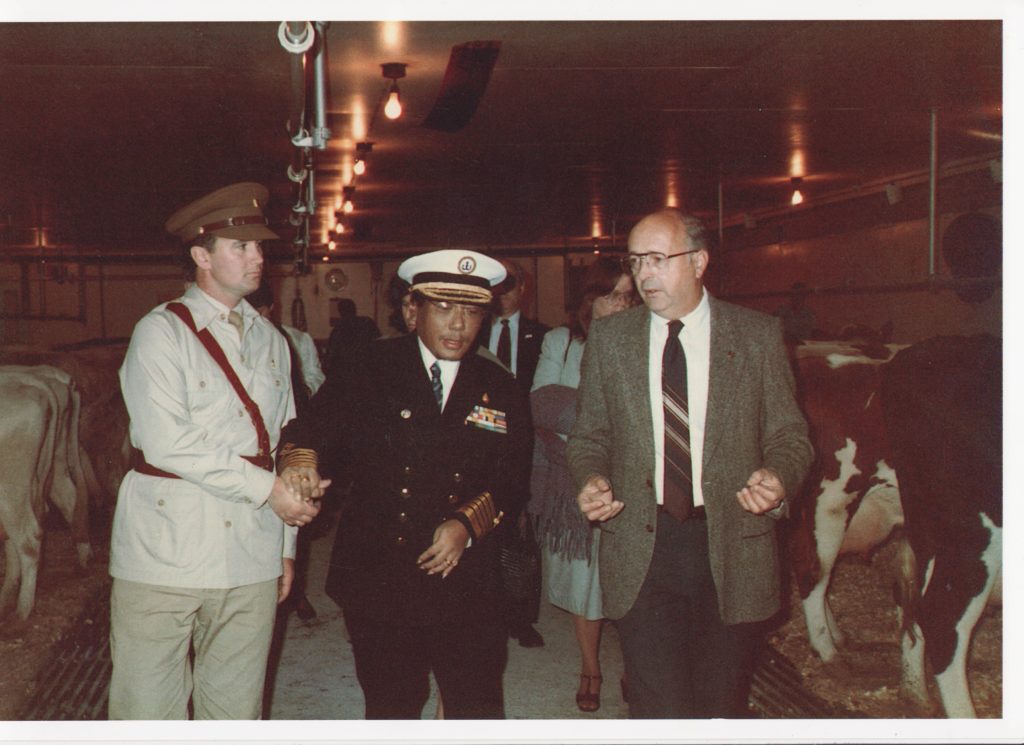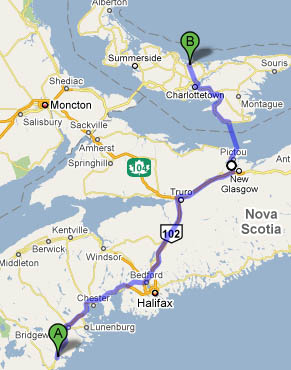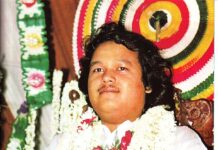Kusung log, September 1984

“We should research PEI,” Rinpoche announced one evening after dinner in early September 1984. It was a golden period in the Mill Village retreat. Rinpoche was generally in a jolly mood—full of mischief and good humor. Many hours were spent preparing food and dining with retreat staff and visitors. During this period of time, Rinpoche took almost daily outings, exploring the local woodlands and beaches in his Land Rover. Sometimes he would visit a nearby cove (which he named White Lotus Cove) to gather seaweed for his dinner, or just to sit for a while on the rocky beach.
The research mission to Prince Edward Island was planned for the following week. Rinpoche invited Jeremy and Karen Hayward, Jim and Ellen Green, and Shari Vogler to join the expedition. I was Rinpoche’s driver and kusung. We traveled to Pictou in a two-car caravan, then took the ferry to Charlottetown, PEI. From there we drove north across the island to the Shaws Hotel on Brackley Beach. Rinpoche’s small apartment was pleasant and nicely furnished. The hotel staff were quite happy to have guests, as it was the end of the season and the inn was mostly empty.
After a dinner of white fish in white sauce and cauliflower (I think Rinpoche ordered for all of us), the party gathered in Rinpoche’s sitting room for a very interesting conversation about farming. Rinpoche talked about the importance of working with the land. He said that we must become good farmers, and that ideally one should be raised on a farm and trained to be a statesman later. Karen Hayward asked if this should be included in the curriculum of the College of the Ashe Prince.* Rinpoche said that yes, farming should be taught at the College of the Ashe Prince, and that we should contact Sherab Chodzin about this idea.

This conversation about the importance of farming continued for some time. Mrs. Vogler remembers that Rinpoche emphasized the importance of farming for those of us who had moved or who were planning to move to Nova Scotiathat in order to settle properly in Nova Scotia, one had to farm or in some way relate properly to the earth and the seasons.
Mrs. Vogler also remembers this short exchange. Jeremy asked, “Sir, do you mean that we should all become farmers, even the Regent?” Rinpoche laughed and said, “Well, yes. Perhaps he could be a gentleman farmer”. My own memory is that he was also talking about our future as a society—that in order to go forward with the vision of Shambhala, farming should become an integral part of our culture.
Late in the day, Rinpoche asked that we make arrangements for him to pay a visit to a governmental agricultural research facility. After a flurry of phone calls, Rinpoche was scheduled to meet with the director of the Canadian Agricultural Department Research Station just outside of Charlottetown the following afternoon.
As we entered the Research Station, the director and his staff received Rinpoche graciously and showed him into a conference room. Jim Green introduced Rinpoche as a prince from Tibet who was visiting the Maritimes to gain a better understanding of the area’s economy and agriculture. Rinpoche asked questions about PEI’s economy, exports, imports, sources of electrical power, breeds of dairy animals, crop rotation, and more. The discussion became quite lively as the director and his staff saw that Rinpoche genuinely wanted to understand how the province worked.
At some point in the conversation, the director suggested that Rinpoche might like to visit their experimental dairy facility. We drove a short distance to a series of modern barns where Rinpoche was shown a number of different breeds of dairy cows. He impressed the staff by distinguishing the various breeds. He was also able to tell that certain cows were a mixture of two or more breeds. About 12 employees gathered around as Rinpoche examined the cows. At one point, he asked to see the animals’ feed. A gentleman brought in a wheelbarrow full of feed. Rinpoche reached into the pile of grain, scooped up a handful and inspected it closely as he let it fall slowly back into the wheelbarrow.
After he had inspected several handfuls of the feed, he turned and told the director that care should be taken not to put too many wheatberries in the feed. He said that they could expand in the cows’ stomachs, and cause digestive problems. The man holding the wheelbarrow, set it down on the ground. He was quite excited and said that this is what he had been trying to tell people for many years.
Karen Hayward remembers another poignant moment during our visit to the dairy facility. A calf was crying and its mother was on the other side of the barn bellowing. One of the staff members told us of the relationship. Rinpoche said very sadly, that we would never separate a calf from its mother like that.
A short while later, Rinpoche met an Indian gentleman who worked at the facility. Rinpoche talked with him in Hindi. This man, who had lived on Prince Edward Island most of his adult life, had not spoken Hindi for a very long time. He was very animated and emotional as he spoke to Rinpoche in his native tongue.
Here is an excerpt from my journal for that day.
September 13, 1984
As we drove away, the employees of the facility and the director and his staff lined the driveway. They waved and smiled, some had damp eyes. It seems that many of them had been moved in a personal way by Rinpoche’s presence.
Rinpoche was visibly delighted with the day’s events, as well as with the people he had met. His royal bearing was impeccable. His interest was genuine and well received. His knowledge of a wide spectrum of disciplines including economics, the feeding of cows, and the cultivation of soil, was shocking and endearing to all with whom he came into contact.
We who had the opportunity to witness Rinpoche in action today learned that the magnetism which draws buddhist students to him is no less powerful outside of a buddhist context.
On the cool sea air
the islanders catch the scent of Shambhala.
Kingship and dairy farming
join on fertile ground.
* The College of the Ashe Prince was a school that was being developed by Trungpa Rinpoche during the last several years of his life as a training ground for statesmen, stateswomen, and diplomats. It was named after the current Sakyong, whose title at that time was The Ashe Prince.











